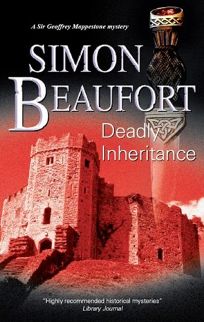Copyright © 2017, Steven E. Houchin. All rights reserved.
Last year I posted an article titled "Observations About Literary Contest Submissions" after being asked to read and score five manuscripts submitted to the Pacific Northwest Writers Association's 2016 Literary Contest. In my posting, I outlined six guidelines and truths about submitting to literary contests, hoping the advice might help new writers who are tempted by a contest. As a two-time finalist and former winner of this contest, I thought maybe I have learned something along the way.
I put my own advice to the test again this year (2017), submitting two entries: a novel and a short story. Both received positive critiques from the first-line readers. And, the novel was chosen as a finalist! I found out in late July that I, unfortunately, did not win this time.
Being a finalist again got me thinking about the guidelines in my earlier posting, and the math involved in contests. In my article, I postulated that simply and precisely following the contest rules, and a cleanly formatted manuscript, would jump you ahead of half the others. Maybe that's an exaggeration, maybe not. But following all my six guidelines may do that and more.
Imagine if you're in a category, like Mystery, with 100 entries. If half of those fail the contest rules and neatness test, your competition drops to 50. Of those, many will fail to write a proper synopsis, maybe 10 of them. Another 20 may fail due to poor writing, such as too much backstory, mundane dialog, no description or scene setting, or a languid pace. So, maybe that 50 now drops to 20 or 25. They are your remaining competition. If the Mystery category has eight finalists, your odds become maybe 1 in 3, versus the original 8 in 100 (about 1 in 12).
Now, my numbers here are pure speculation, but are based on experience having been a reader/scorer for the PNWA contest three times. So, I've seen for myself how often author submissions fall into that bottom 75% where glaring mistakes doom their entries.
So, if you want to greatly increase your odds of being a finalist in a contest, paying attention to the details, and the experience of others, is a good start.
Writing is a constant process of learning. Learning usually comes from those who share what they know. Here, I share what I think I've learned about writing along the way.
Wednesday, August 23, 2017
Monday, July 3, 2017
Backstory Blues
Copyright © 2017 Steven E. Houchin. All rights reserved.
One thing that drives me nuts as a reader is the overuse of backstory in a novel, especially when the genre is not literary fiction.

What instigated my grumbling at this time is Alex Kava's A Necessary Evil, which I'd read about one-third through. It introduces a number of characters, some of which are detectives or investigators and such, and some are perpetrators. But what I find, in chapter after chapter, is a story crawling at a snail's pace as the author plunges into the character's miserable past or dysfunctional old relationships. For example, the main character, a female FBI agent, must work with a local female detective on a murder. But in the past, the detective had made a pass at the agent, and now their working relationship is strained. Added to that, the detective once saved the agent's mother from suicide. But also, the agent had once rescued the detective's father from a serial killer. Can you say contrived? But that's just the start of boring backstories whose purpose seems mainly to fill page space and give the impression of conflict.
In my opinion, a murder mystery or suspense thriller is about the story, the plot. It's certainly mandatory to create compelling characters in a genre novel, but that can be done by showing their actions and relationships in the now - often through dialog - not by contrived family backgrounds. I'm not against giving a bit of character history, such as explaining how the protagonist became widowed, or how she inherited wealth from her industrialist father. Just weave it naturally into the story - a paragraph here and there - rather than constantly dumping out several paragraphs of the stuff time after time.

And, of course, the worst backstory sin of all: filling Chapter One with it. Arrrgh! Does anything make a reader gag more that that? Yes, sadly. Finding even more in Chapter Two.
I was having lunch with a few writer friends recently, and one author described a novel of his where the plot seemed to rely on a series of implausible character and family relationships that would do any TV soap opera proud. I cringed at the inevitable pages of backstory it must contain to untangle all the mess. And, in the end, would it have any discernable plot?
So, I did not bother finishing the last two-thirds of A Necessary Evil. I found myself skipping over paragraphs whenever a hint of dreaded backstory crept in. It just isn't worth it, wading though all that to try to get back to the actual story.
Many good articles exist online that discuss the evils of backstory done wrong and how to do it better. So I won't attempt to expound on it here. Suffice to say, it's a disease that plagues aspiring writers and experienced, published authors alike.
And please ... don't get me started on flashbacks. But, that's for another time.
One thing that drives me nuts as a reader is the overuse of backstory in a novel, especially when the genre is not literary fiction.

What instigated my grumbling at this time is Alex Kava's A Necessary Evil, which I'd read about one-third through. It introduces a number of characters, some of which are detectives or investigators and such, and some are perpetrators. But what I find, in chapter after chapter, is a story crawling at a snail's pace as the author plunges into the character's miserable past or dysfunctional old relationships. For example, the main character, a female FBI agent, must work with a local female detective on a murder. But in the past, the detective had made a pass at the agent, and now their working relationship is strained. Added to that, the detective once saved the agent's mother from suicide. But also, the agent had once rescued the detective's father from a serial killer. Can you say contrived? But that's just the start of boring backstories whose purpose seems mainly to fill page space and give the impression of conflict.
In my opinion, a murder mystery or suspense thriller is about the story, the plot. It's certainly mandatory to create compelling characters in a genre novel, but that can be done by showing their actions and relationships in the now - often through dialog - not by contrived family backgrounds. I'm not against giving a bit of character history, such as explaining how the protagonist became widowed, or how she inherited wealth from her industrialist father. Just weave it naturally into the story - a paragraph here and there - rather than constantly dumping out several paragraphs of the stuff time after time.

And, of course, the worst backstory sin of all: filling Chapter One with it. Arrrgh! Does anything make a reader gag more that that? Yes, sadly. Finding even more in Chapter Two.
I was having lunch with a few writer friends recently, and one author described a novel of his where the plot seemed to rely on a series of implausible character and family relationships that would do any TV soap opera proud. I cringed at the inevitable pages of backstory it must contain to untangle all the mess. And, in the end, would it have any discernable plot?
So, I did not bother finishing the last two-thirds of A Necessary Evil. I found myself skipping over paragraphs whenever a hint of dreaded backstory crept in. It just isn't worth it, wading though all that to try to get back to the actual story.
Many good articles exist online that discuss the evils of backstory done wrong and how to do it better. So I won't attempt to expound on it here. Suffice to say, it's a disease that plagues aspiring writers and experienced, published authors alike.
And please ... don't get me started on flashbacks. But, that's for another time.
Tuesday, March 28, 2017
Agents and #MSWL
Copyright © 2017 Steven E. Houchin. All rights reserved.
I ran across the MS Wish List website the other day while searching for more agents to query. It looks like a great resource. An author can select a genre and see a list of agents/editors/pubishers who are interested in that genre. And, the genre selections are numerous. After choosing a few candidate agents, I poked around a bit more on the site.
From what I can tell, this site is a filter for various Twitter hashtags related to agents/editors/publishers. The one I used to select agents by genre was #MSWL. A selection menu along the top chooses other hashtags, such as #AskAgent, #Querytip and #Pubtip, and various hashtags giving reasons why queries are accepted or rejected. I'm not sure how it all works, but I suspect the agents, etc. register on the site and then their hashtagged tweets are snagged and displayed in the proper category.

One disconcerting thing is the tweets come with no context, especially the query tweets. It gets confusing. I suppose you have to navigate to the original tweeter site to see more. Another thing: looking at the tweets shows lots of other interesting hashtags related to writing and querying (#amwriting, #amreading, #amquerying, #QueryMe).
One exciting thing I saw on the raw #MSWL Twitter site was that February 8, 2017 was proclaimed as "MSWL Day" on the site. I gather it means agents/editors/publishers were tweeting like mad what they're looking for. I was quite interested to see what it looked like, and found several leads for sending out queries. I also saw trends that I need to keep in mind for future projects, such as women protagonists or characters/heroes from "underrepresented groups."
I ran across the MS Wish List website the other day while searching for more agents to query. It looks like a great resource. An author can select a genre and see a list of agents/editors/pubishers who are interested in that genre. And, the genre selections are numerous. After choosing a few candidate agents, I poked around a bit more on the site.
From what I can tell, this site is a filter for various Twitter hashtags related to agents/editors/publishers. The one I used to select agents by genre was #MSWL. A selection menu along the top chooses other hashtags, such as #AskAgent, #Querytip and #Pubtip, and various hashtags giving reasons why queries are accepted or rejected. I'm not sure how it all works, but I suspect the agents, etc. register on the site and then their hashtagged tweets are snagged and displayed in the proper category.
One disconcerting thing is the tweets come with no context, especially the query tweets. It gets confusing. I suppose you have to navigate to the original tweeter site to see more. Another thing: looking at the tweets shows lots of other interesting hashtags related to writing and querying (#amwriting, #amreading, #amquerying, #QueryMe).
One exciting thing I saw on the raw #MSWL Twitter site was that February 8, 2017 was proclaimed as "MSWL Day" on the site. I gather it means agents/editors/publishers were tweeting like mad what they're looking for. I was quite interested to see what it looked like, and found several leads for sending out queries. I also saw trends that I need to keep in mind for future projects, such as women protagonists or characters/heroes from "underrepresented groups."
Wednesday, February 1, 2017
Book Review: Deadly Inheritance
Copyright © 2016, Steven E. Houchin. All rights reserved.
Sir Geoffrey Mappestone returns from the Crusades in 1103 to his family's Goodrich Castle in Herefordshire, only to find that his brother, Henry, has been murdered. His sister, Joan, his brother-in-law, and servants show no interest in finding the killer. Geoffrey learns that everyone hated Henry, who was brutal and addicted to drink. The lords of neighboring manors distrust Geoffrey because knights of the Crusade have a violent reputation.

Geoffrey is determined to find his brother's killer. But he is also nagged by Joan's demand he immediately get married and produce an heir. Without an heir, he is a likely target for murder himself by neighboring manor lords who desire to absorb his estate into theirs. So, several women are proposed as mates, none of which appeal to Geoffrey. In addition to the woes he already has, a prominent priest asks him to investigate another murder, one that happened months ago over in Normandy. Other murders soon occur, seemingly related to Henry's murder.
When later one of his neighbors launches an attack on Goodrich, Geoffrey is forced to mobilize the men of his estate into a fighting force.
The "author", Simon Beaufort (in reality a pseudonym of Susanna Gregory and Beau Riffenburgh when they write jointly), fills the pages with rich details that seem authentic for the period. They pile more and more demands on poor Geoffrey, who simply wants to live in peace on his estate. Deadly Inheritance (number six in the Mappestone series) is hard to put down as the action and mystery keep rolling on. It is definitely worth the read.
Sir Geoffrey Mappestone returns from the Crusades in 1103 to his family's Goodrich Castle in Herefordshire, only to find that his brother, Henry, has been murdered. His sister, Joan, his brother-in-law, and servants show no interest in finding the killer. Geoffrey learns that everyone hated Henry, who was brutal and addicted to drink. The lords of neighboring manors distrust Geoffrey because knights of the Crusade have a violent reputation.

Geoffrey is determined to find his brother's killer. But he is also nagged by Joan's demand he immediately get married and produce an heir. Without an heir, he is a likely target for murder himself by neighboring manor lords who desire to absorb his estate into theirs. So, several women are proposed as mates, none of which appeal to Geoffrey. In addition to the woes he already has, a prominent priest asks him to investigate another murder, one that happened months ago over in Normandy. Other murders soon occur, seemingly related to Henry's murder.
When later one of his neighbors launches an attack on Goodrich, Geoffrey is forced to mobilize the men of his estate into a fighting force.
The "author", Simon Beaufort (in reality a pseudonym of Susanna Gregory and Beau Riffenburgh when they write jointly), fills the pages with rich details that seem authentic for the period. They pile more and more demands on poor Geoffrey, who simply wants to live in peace on his estate. Deadly Inheritance (number six in the Mappestone series) is hard to put down as the action and mystery keep rolling on. It is definitely worth the read.
Subscribe to:
Posts (Atom)
